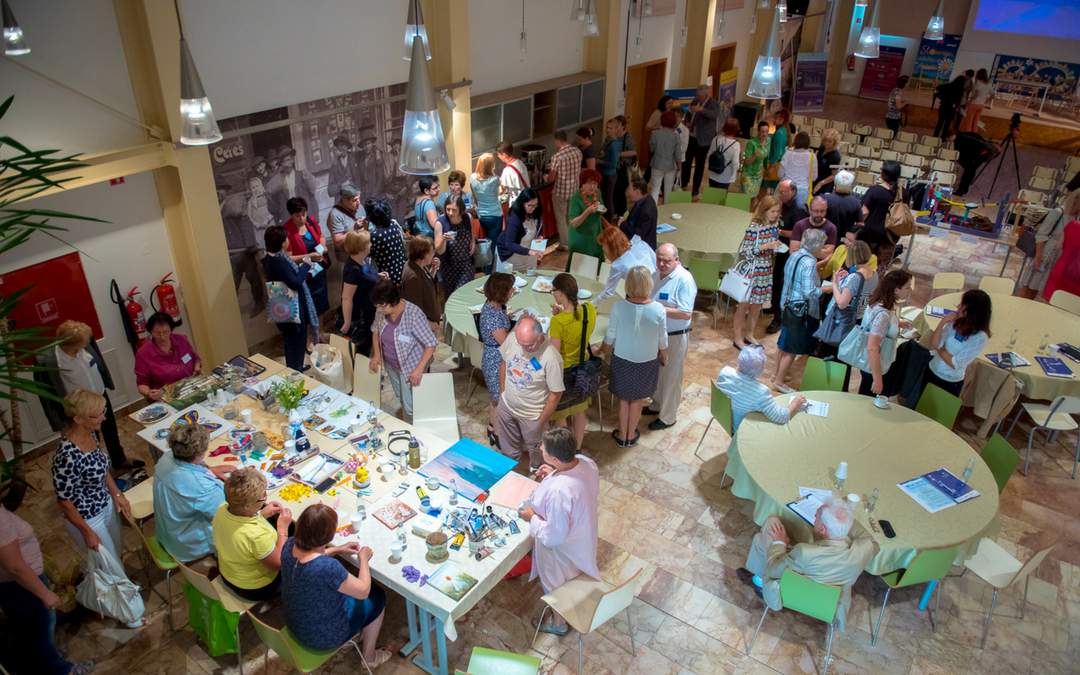At the 22nd Adult Education Colloquium the expert contributions on importance and opportunities for development of key competences of older people were interspersed with experiences (a film, a theatre show, a chain experiment, a folklore performance, etc.) and presentation of activities in this period of life.
After the introductory speeches of our hosts (in Slovenian) and the co-organisers, the audience was addressed by Mija Pukl, the vice-president of the Federation of Pensioner Associations of Slovenia (Zveza društev upokojencev Slovenije – ZDUS). She underlined the importance of changing the common perception of a dignified life of older people in our society and stressed that the change should be driven by the older people themselves who are actively involved in different associations. Dr Ana Kranjc also mentioned societal patterns and limitations in her lecture (in Slovenian). In the introduction she pointed out that the design of the AEC already “signals a new paradigm that tells us what the actual competences of people are. An individual cannot grow as a person, cannot be independent and creative, cannot make the right decisions quickly, if he or she does not have a developed personality. Competences are personal characteristics /…/ competences are experiences …” Jumbo Klercq, EPALE ambassador from the Netherlands and member of the management board of the Dutch platform Learn for Life, spoke about the effects of learning in a later period of life and about the training of educators.
As an introduction into the second part of expert contributions, Stane Arh, a pensioner from Jesenice, presented a chain experiment: a set of machines that are triggered one after the other by the same bead. The benefit of this chain experiment for everyone involved (kindergarten children, students and pensioners) is the transfer of knowledge. It encourages you to think creatively and to develop manual skills. They learn about the entire building process from an idea to a plan and to the final testing. In continuation, Dr. Tina Bilban talked about the Stories of Ageing, a project that wants to convince all generations, especially the young, that ageing is also their business. Knowledge is what can really help us understand, accept and guide this process. The dialogue about ageing can start with good literature on the topic of old age and ageing and expand with discussions of scientific and philosophical views on ageing, and reflections of our own experiences and views. This part of the programme concluded with a panel discussion. The older adults presented their own experiences with inclusion into activities offered by different local organisations and their suggestions for inclusion of those who isolate themselves.
As an introduction into the second part of expert contributions, Stane Arh, a pensioner from Jesenice, presented a chain experiment: a set of machines that are triggered one after the other by the same bead. The benefit of this chain experiment for everyone involved (kindergarten children, students and pensioners) is the transfer of knowledge. It encourages you to think creatively and to develop manual skills. They learn about the entire building process from an idea to a plan and to the final testing. In continuation, Dr. Tina Bilban talked about the Stories of Ageing, a project that wants to convince all generations, especially the young, that ageing is also their business. Knowledge is what can really help us understand, accept and guide this process. The dialogue about ageing can start with good literature on the topic of old age and ageing and expand with discussions of scientific and philosophical views on ageing, and reflections of our own experiences and views. This part of the programme concluded with a panel discussion. The older adults presented their own experiences with inclusion into activities offered by different local organisations and their suggestions for inclusion of those who isolate themselves.
In the last part of the conference, Ana Samsa, the head of the Mental exercise (Umska vadba – in Slovenian) section at the LUJ showed us in very simple terms how to keep the brain in good condition. Polona Avsenak, a pensioner, lecturer and occasional participant in programmes for older people shared with us her perspective on the advanced age which brings her new challenges. We concluded the AEC with the second panel discussion that included the organisers of educational programmes, the educators and the guidance counsellors. They tried to find answers to the questions such as: how to include the non-active population, what topics to offer to the older population, how to successfully promote the activities, how to offer comprehensive support to the participants, etc.
The event spoke to all my senses and satisfied my curiosity. I can easily identify with this idea by one of the participants: “I do not wish for a long life (what even is a long life?), I wish for an active life, for a good quality of life.”
Nevenka Kocijančič (nevenka.kocijancic@SIAE.si), SIAE



